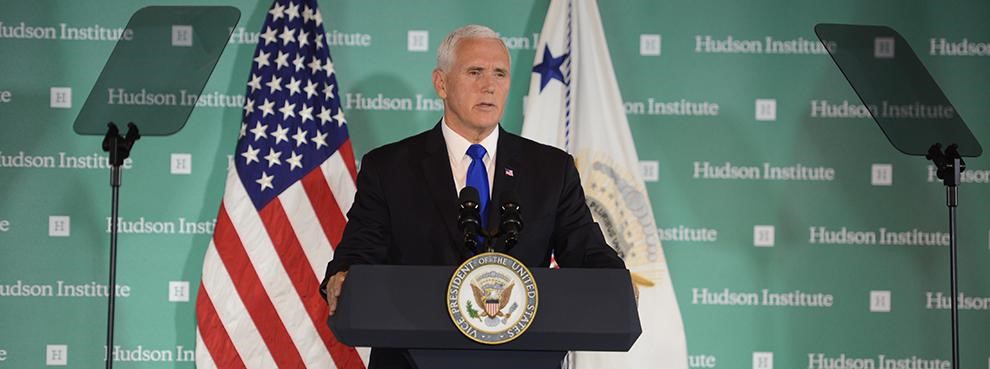Water Wars: Pence Accuses China of Domestic Interference and Warships Have Close-Call in South China Sea
In a speech delivered on Oct. 4, Vice President Mike Pence escalated the Trump administration’s rhetoric against China. At the Hudson Institute, Pence warned that Beijing represents the greatest strategic competitor to the United States and outlined what the U.S. sees as increased economic and political interference by China, in addition to the existing military competition.

In a speech delivered on Oct. 4, Vice President Mike Pence escalated the Trump administration’s rhetoric against China. At the Hudson Institute, Pence warned that Beijing represents the greatest strategic competitor to the United States and outlined what the U.S. sees as increased economic and political interference by China, in addition to the existing military competition.
Much of the speech focused on what Pence called China’s attempts to “exert influence and interfere in the domestic policy and politics of our country.” These attempts he discussed included tariffs targeted at agricultural areas of the U.S., investment in pro-China cultural institutes, pressure on academics and journalists and monitoring of Chinese nationals in the United States.
Pence also focused on economic competition between the powers, including China’s use of protectionist tariffs and currency manipulation, its policies of forced technological transfer by foreign companies, and its economic espionage within the United States.
Chinese Foreign Ministry Spokesperson Hua Chunying responded on Oct. 5 with a statement saying that the speech “made unwarranted accusations” and “slandered China.” The statement further stated that China “unswervingly pursues the path of peaceful development” but that it also will “firmly safeguard our sovereignty, security, and development interests.”
Vice President Pence’s speech comes as the U.S. is ratcheting up pressure on China both economically and militarily. On Sept. 17 President Donald Trump announced a new set of tariffs on China totaling approximately $200 billion. This year’s National Defense Authorization Act also created new restrictions on Chinese investment in the United States while strengthening the regulatory board that oversees technology and industries with potential national security applications, the Committee on Foreign Investment in the United States (CFIUS).
The U.S. Pacific Fleet is also reportedly planning a major “show of force” in November to demonstrate U.S. resolve. This proposed show of force would consist of military exercises throughout the Pacific, potentially including FONOPs in the South China Sea and near the Taiwan Strait—areas China where has long opposed U.S. operations.
In Other News…
In the Maldives
On Sept. 23, opposition candidate Ibrahim Mohamed Solih defeated incumbent Abdulla Yameen in the Maldives’ presidential elections, ending a five-year rule characterized by a constitutional crisis and an increasing turn towards China.
Solih, an experienced legislator, won 58 percent of the vote leading a diverse coalition of opposition parties, including his own Maldivian Democratic Party and two separate pro-Islam political parties. In addition to the difficulty of balancing the competing interests of these factions, Solih will also be governing with two former Maldivian leaders in his coalition: Maumoon Abdul Gayoom, who ruled from 1978 to 2008 and whose arrest in February 2018 contributed to this year’s constitutional crisis, and Mohamed Nasheed, the president from 2009 to 2012, who is currently living in exile in England as a political refugee.
This election has geopolitical significance because both China and India have a strategic interest in the Maldives due to their location off the coast of India, and President Yameen had taken a notably pro-Chinese stance over his five years in power.
The new president may be considering reducing his country’s reliance on China. China has invested significantly in the Maldives through its Belt & Road Initiative, with projects including a bridge linking the capital to a nearby island, and an international airport. The Maldives have financed much of these infrastructure investments with debt, which currently totals $1.3 billion, a third of the country’s GDP. However, Solih is reportedly considering following the lead of Malaysia’s new prime minister, Mohamad Mahathir, who cancelled multiple Belt & Road projects to reduce his country’s debt.
China, in turn, has congratulated the Maldives on its smooth transition of power, with Foreign Ministry Spokesperson Geng Shuang saying that China “respects the choice made by the people in the Maldives” while citing the mutual benefits of the Belt & Road Initiative.
At the ASEAN Conference
Both China and the United States have agreed in principle to a new set of guidelines governing encounters between military aircrafts in the South China Sea. These guidelines emerged from a meeting between the defense ministries of the ten countries of the Association of Southeast Asian Nations (ASEAN), who conducted their annual meeting from Oct. 18 through 20.
While China and the U.S. are not members of ASEAN, they are members of ASEAN-plus eight partners, which also includes Japan, India, and other nations with interests in the region. These eight nations met on Oct. 20 following the meeting of the ASEAN nations, with the United States represented by Defense Secretary James Mattis and China represented by Defense Minister General Wei Fenghe.
The new guidelines apply in the airspace over the South China Sea, and are intended to reduce the risk of an aerial accident by providing for a common code of conduct and methods of communication, and by discouraging aircrafts from conducting maneuvers that may appear threatening.
Singapore Defense Minister Ng Eng Hen said in his announcement of the agreement on Oct. 19 that the guidelines, while not foolproof, would reduce the risk of an accident.
“[They] are like a seat belt. They do not completely protect you but at least they provide some protection,” he said.
These guidelines build on the 2014 Code of Unplanned Encounters at Sea, a similar code of conduct governing encounters by military naval vessels.
Mattis and Wei are also reported to have met informally at the conference to discuss the relationship between their two countries, with the U.S. Department of Defense describing the meeting as “straightforward and candid.” China cancelled a previously scheduled meeting between Mattis and the Chinese Ministry of Defense, likely due to rising tensions.
In the South China Sea
The United States continued to conduct both naval and aerial operations in the South China Sea ahead of the ASEAN conference as part of its commitment to contesting Chinese claims to the region.
On Sept. 30 the U.S. guided-missile destroyer USS Decatur sailed within 12 nautical miles of the Gaven and Johnson reefs, parts of the Spratly Islands, while conducting a freedom of navigation operation (FONOP). The United States asserts the right under international law to sail its warships in these Chinese-claimed waters and has long used such FONOPs to push back against what it sees as excessive maritime claims.
In response, a Chinese warship came within 45 yards of the destroyer, forcing it to maneuver to avoid collision. This is a far more assertive action than China normally conducts in response to U.S. FONOPs, and Pence cited it in his Oct. 4 speech as an example of Chinese aggression.
The United States also conducted multiple flights of B-52 bombers in the South China Sea at both the end of September and on Oct. 18, during the ASEAN conference.
The U.S. Department of Defense has referred to these as routine training missions, but Defense Ministry spokesman Ren Guoqiang told reporters in September that such actions were “provocative” and that China would “take all necessary means to safeguard our rights and rights and interests.”
In a conference on Sept. 26, Secretary Mattis responded to Chinese criticism by saying that it was China’s own actions that led it to perceive these flights as aggressive. “If it was 20 years ago and had they not militarized those features there it would have been just another bomber on its way to Diego Garcia or wherever,” he said.
Analysis and Commentary
In the South China Morning Post, Bhavan Jaipragas argues that Pence’s speech was aimed at not only China but also the other countries in the region. Integrating analysis from an array of experts on the region, Jaipragas describes Pence’s speech, which painted China as America’s main strategic rival, as intended to force these countries to pick a side between the U.S. and China on issues such as the South China Sea. America’s traditional allies such as France and England have recently taken a more-aggressive stance on the South China Sea, he explains, but many countries in the region have attempted to balance between the two powers.
In the Diplomat, both Ankit Panda and Rajeswari Pillai Rajagopalan caution that the new presidency of the Maldives may not lead to significant changes in the country’s relationship with China. Despite the change in leadership, they argue, China and the Maldives are too economically integrated for a true break in economic or diplomatic relations to be likely.
And at CNBC, Nyshka Chandran consults with multiple experts to conclude that military relations between China and the United States are likely to remain brittle, despite the cordial meeting between Mattis and Wei at ASEAN this month, because of the economic and political competition between the two countries.





